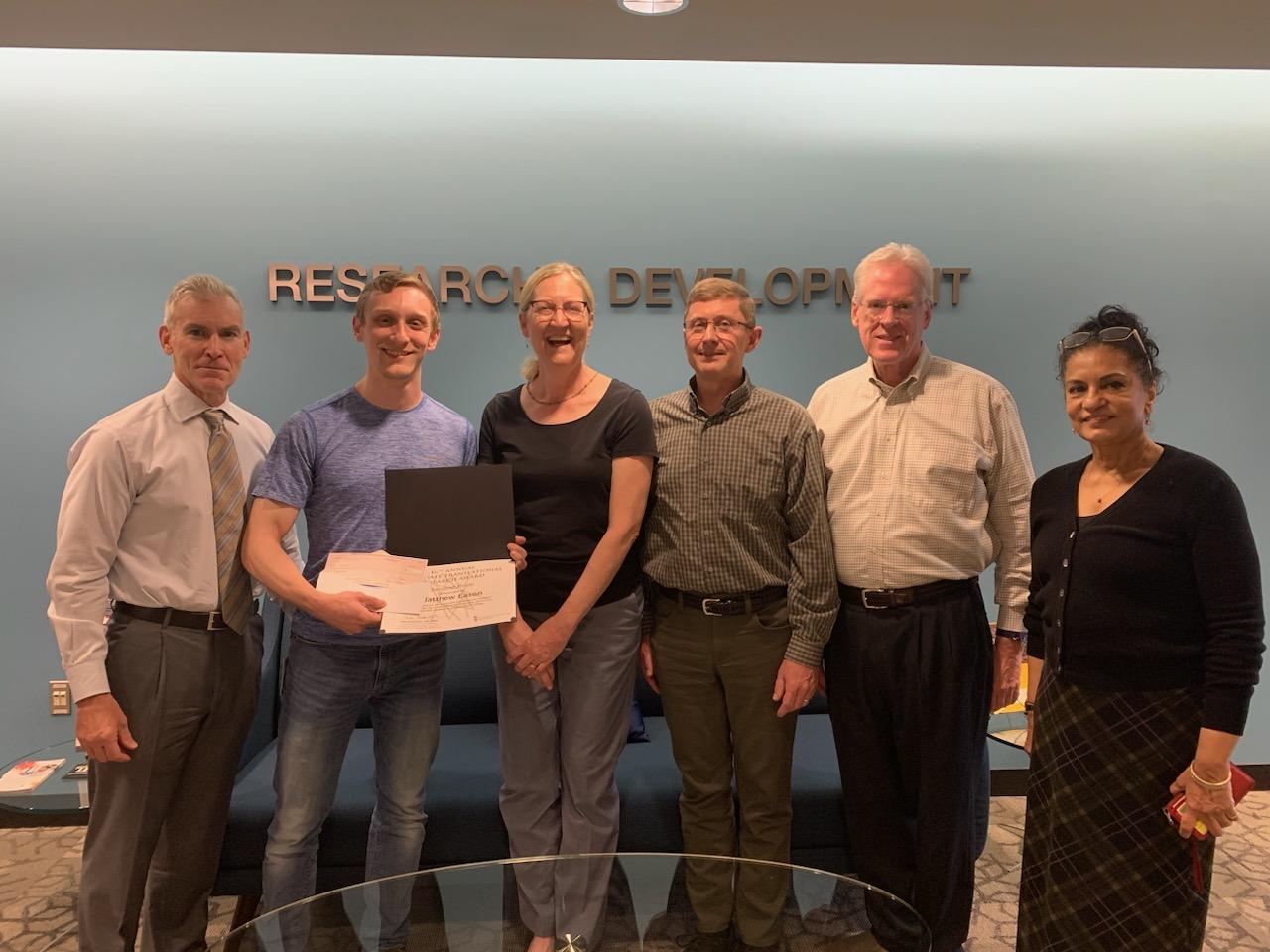UMSOM’s Eason Awarded Second Prize in 16th Annual Graduate Translational Research Competition
June 18, 2024 Claire Murphy
The MD/PhD candidate’s project focuses on how to utilize the protein obscurin to construct a new and effective therapy that inhibits metastatic spread of breast cancer tumors.
Photo: Matthew Eason, second from left, is presented an award certificate by, from left, Phil Robilotto, Nancy Cowger, Jeff Purnell, Robert McCarthy, JD, PhD, and Rana Quraishi, PhD.
Matthew Eason, a University of Maryland School of Medicine (UMSOM) MD/PhD candidate, was awarded second prize for his submission in the 16th annual Graduate Translational Research (GTR) competition. Eason’s project focuses on how to utilize the protein obscurin to construct a new and effective therapy that inhibits metastatic spread of breast cancer tumors.
According to the American Cancer Society, breast cancer is one of the most common cancers in women in the United States, accounting for about 30 percent of all new cancers in females each year. Metastasis, or the spread of cancerous cells to other organs, is the No. 1 killer of breast cancer patients. To combat this process, therapies using synthetic compounds have been in development for decades, but their safety for use in patients has been stymied by their toxicity and side effects.
“Investigating and developing novel therapies for metastatic breast cancer is critical as existing options are not effective,” Eason said. “I have focused my PhD research on targeting and suppressing the ‘transformation’ of a treatable localized breast cancer tumor before it becomes one that is metastatic and therefore clinically challenging and ultimately lethal.”
Working in the lab of Aikaterini Kontrogianni-Konstantopoulos, PhD, vice chair and professor of biochemistry and molecular biology at UMSOM, Eason has been studying how obscurin can be exploited to suppress the metastatic process. The lab had previously identified that obscurin serves as a roadblock, preventing tumors of the breast from spreading to other critical body organs. Eason’s project builds on this work and has resulted in novel findings that show promise for the potential formulation of a more effective breast cancer therapy.
Eason, in Kontrogianni-Konstantopoulos’s lab, collaborated with the labs of Anthony Kim, PhD, professor of neurosurgery and pharmacology at UMSOM; Stuart Martin, PhD, chair and professor of pharmacology, physiology, and drug development at UMSOM; Konstantinos Konstantopoulos, PhD, professor of chemical and biomolecular engineering at Johns Hopkins University; and Nathan Wright, PhD, associate professor of biochemistry at James Madison University.
After earning his MD/PhD, Eason plans to focus on oncology/hematology. Long term, his goal is to treat patients as an oncologist/hematologist while continuing his research of cancer metastasis and the tumor microenvironment as a principal investigator, ultimately translating his discoveries from bench to bedside.
“I am interested in investigating and developing therapies that have the potential to improve survival for breast cancer patients,” Eason said. “To be able to make a significant positive impact in the lives of patients that are battling cancer is both humbling and exciting.”
“It has been my absolute pleasure working with Matthew and our excellent team of collaborators on this exciting translational project,” Kontrogianni-Konstantopoulos said. “Beyond delving into the depths of fundamental biological questions, which enrich our understanding of breast cancer progression, our ambition extends to forging a path toward the development of a novel targeted and effective anti-metastatic therapy.
“Our goal is to restore the functionality of the pivotal protein obscurin serving as ‘safeguard’ against metastasis in healthy cells, which is commonly lost in breast cancer cells, rendering them highly aggressive and metastatic. We envision a suppression of cellular dissemination from local primary tumors, thereby alleviating the burdensome weight of metastatic spread of breast cancer and ultimately other solid tumors, given the nearly ubiquitous expression of obscurin.”
The GTR award, presented in conjunction with the University of Maryland Graduate School's annual Graduate Research Conference, recognizes the significant translational research conducted by a University of Maryland, Baltimore (UMB) graduate student or postdoctoral fellow. It embodies the mission of UM Ventures, Baltimore, which seeks to translate the outcomes of basic research into practical applications.
This year’s judge panel included Jeff Purnell, PhD, senior licensing officer; Melissa Blackman, PhD, senior licensing officer; Rebecca Bettes, MS, MBA, senior licensing officer; and Nancy Cowger, PhD, executive director of licensing and alliances. Competition was significant again this year, with 15 qualified applicants from the schools of medicine, pharmacy, and dentistry, and our judging team also was impressed by the skillful conference presentations of this year’s applicants.
“My colleagues and I had the chance to engage with Matthew at the Graduate Research Conference in prior years, ” Cowger said. “We’ve known Matthew as a skilled presenter who’s very enthusiastic about his research, and he certainly demonstrated those qualities at this year’s conference. We’re pleased to give the GTR award to such a qualified candidate and wish him much success in his future career.”
Purnell, who manages the intellectual property developed in Kontrogianni-Konstantopoulos’s research lab, said, “Matthew has presented exciting results which will hopefully become a future therapy for metastatic breast cancer. We are happy to be able to highlight his accomplishments with the GTR award.”